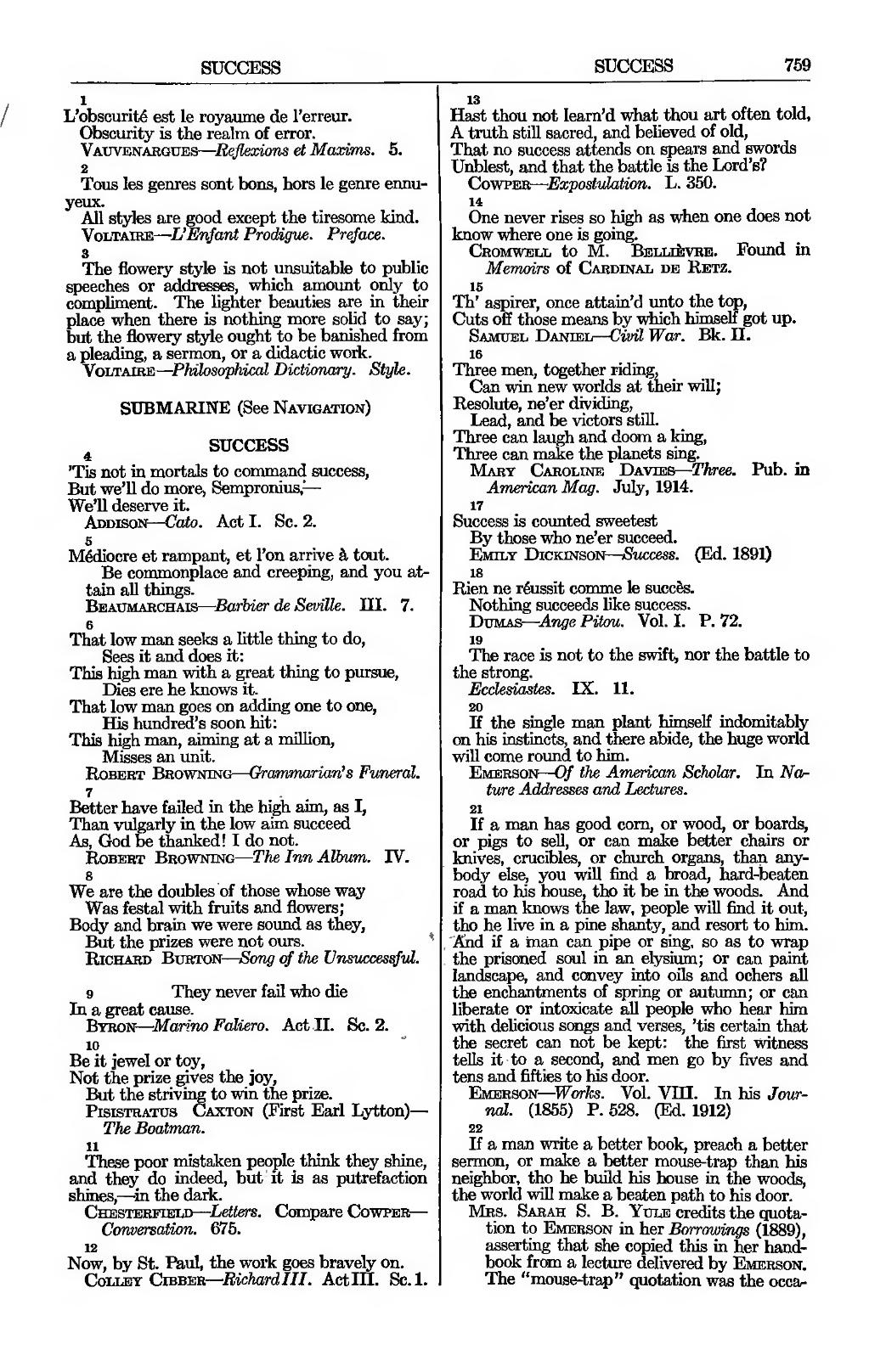SUCCESS SUCCESS
L'obscurite' est le royaume de l'erreur.
Obscurity is the realm of error.
Tous les genres sont bons, hors le genre ennuyeux.
All styles are good except the tiresome kind.
Voltaire—L'Enfant Prodigue. Preface.
The flowery style is not unsuitable to public
speeches or addresses, which amount only to
compliment. The lighter beauties are in their
place when there is nothing more solid to say;
but the flowery style ought to be banished from
a pleading, a sermon, or a didactic work.
Voltaire—Philosophical Dictionary. Style.
SUBMARINE (See Navigation)
SUCCESS
'Tis not in mortals to command success,
But we'll do more, Sempronius,—
We'll deserve it.
| author = Addison
| work = Cato. Act I. Sc. 2.
Mecliocre et rampant, et Ton arrive a tout.
Be commonplace and creeping, and you attain all things.
Beaumarchais—Barbier de Seville. III. 7.
That low man seeks a little thing to do,
Sees it and does it:
This high man with a great thing to pursue,
Dies ere he knows it.
That low man goes on adding one to one,
His hundred's soon hit:
This high man, aiming at a million,
Misses an unit.
Robert Browning—Grammarian's Funeral.
7
Better have failed in the high aim, as I,
Than vulgarly in the low aim succeed
As, God be thanked! I do not.
Robert Browning—The Inn Album. IV.
We are the doubles of those whose way
Was festal with fruits and flowers;
Body and brain we were sound as they,
But the prizes were not ours.
Richard Burton—Song of the Unsuccessful.
They never fail who die
In a great cause.
| author = Byron
| work = Marino Faliero. Act II. Sc. 2.
Be it jewel or toy,
Not the prize gives the joy,
But the striving to win the prize.
| author = Pisistratus Caxton
| cog = (First Earl Lytton)
| work = The Boatman.
| topic =
| page = 759
}}
{{Hoyt quote
| num =
| text = <poem>These poor mistaken people think they shine,
and they do indeed, but 'it is as putrefaction
shines,—in the dark.
Chesterfield—Letters. Compare Cowper—
Conversation. 675.
Now, by St. Paul, the work goes bravely on.
Collet Cibber—BichardlH. ActlH. Sc. 1.
Hast thou not Iearn'd what thou art often told,
A truth still sacred, and believed of old,
That no success attends on spears and swords
Unblest, and that the battle is the Lord's?
| author = Cowper
| work = Expostulation. L. 350.
One never rises so high as when one does not
know where one is going.
Cromwell to M. BellievHe. Found in
Memoirs of Cardinal de Retz.
Th' aspirer, once attain'd unto the top,
Cuts off those means by which himself got up.
Samuel Daniel—Civil War. Bk. II.
Three men, together riding,
Can win new worlds at their will;
Resolute, ne'er dividing,
Lead, and be victors still.
Three can laugh and doom a king,
Three can make the planets sing.
Mart Caroline Davtes—Three. Pub. in
American Mag. July, 1914.
Success is counted sweetest
By those who ne'er succeed.
Emtlt Dickinson—Success. (Ed. 1891)
| topic =
| page = 759
}}
{{Hoyt quote
| num =
| text = <poem>Rien ne reussit comme le succes.
Nothing succeeds like success.
Dumas—Ange Pitou. Vol. I. P. 72.
The race is not to the swift, nor the battle to
the strong.
Ecclesiastes. LX. 11.
If the single man plant himself indomitably
on his instincts, and there abide, the huge world
will come round to him.
Emerson—Of the American Scholar. In Nature Addresses and Lectures.
<poem>If a man has good corn, or wood, or boards,
or pigs to sell, or can make better chairs or knives, crucibles, or church organs, than anybody else, you will find a broad, hard-beaten road to his house, tho it be in the woods. And if a man knows the law, people will find it out, tho he live in a pine shanty, and resort to him. "And if a man can pipe or sing, so as to wrap the prisoned soul in an elysium; or can paint landscape, and convey into oils and ochers all the enchantments of spring or autumn; or can liberate or intoxicate all people who hear him with delicious songs and verses, 'tis certain that the secret can not be kept: the first witness tells it to a second, and men go by fives and tens and fifties to his door. Emerson—Works. Vol. VIII. In his Journal. (1855) P. 528. (Ed. 1912)
<poem>If a man write a better book, preach a better sermon, or make a better mouse-trap than his neighbor, tho he build his house in the woods, the world will make a beaten path to his door.
